Darwen
Formed 1870. Wound up 1899.
Elected to The Football League 1891. Resigned 1899
Kit History
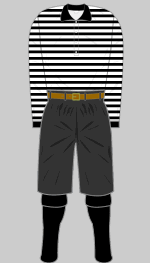
1875 c
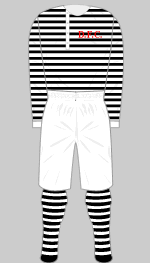
1877-c1882 b d g h i
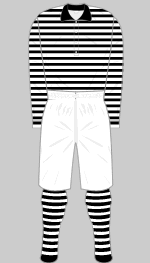
c1882-1891 e i
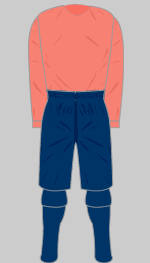
1891-1892 a i
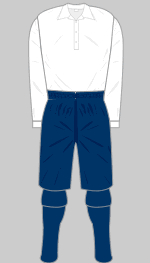
1892-1893 f
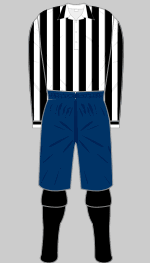
1894-1895 d

1896-1898 d
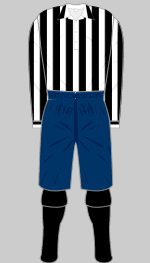
1898-1899 a d
Background
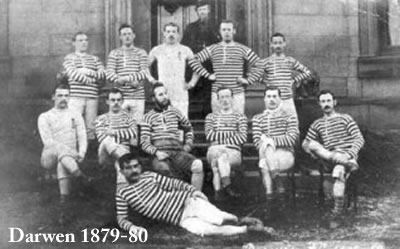 Darwen can trace their history back as far as 1870 as a football and cricket club formed on the initiative of Mr JC Ashton and the three sons of cotton-mill owner, Nathaniel Walsh. The Walsh boys had been sent to Harrow where they had no doubt played football under that public shool's unique rules. In 1875 the club adopted the newly drawn up Association rules and played their first match against Turton FC, a fixture that had to be abandoned due to fighting between supporters.
Darwen can trace their history back as far as 1870 as a football and cricket club formed on the initiative of Mr JC Ashton and the three sons of cotton-mill owner, Nathaniel Walsh. The Walsh boys had been sent to Harrow where they had no doubt played football under that public shool's unique rules. In 1875 the club adopted the newly drawn up Association rules and played their first match against Turton FC, a fixture that had to be abandoned due to fighting between supporters.
In these formative years, when the game was dominated by the teams of gentlemen-players from the Home Counties, Darwen's committee  consisted of prominent businessmen while the players were working men drawn mainly from local cotton mills who played the passing game pioneered by Queen's Park in Scotland. This approach to club management and team play would transform the game. In 1878 Darwen engaged the first of what would become known as the "Scotch Professors," in Fergie Suter and James Love. Suter, a stonemason and talented player with Partick Thistle, was induced to move south after the two clubs met in a fixture on New Year's Day, 1878, with promises of a job. The club secretary consistently denied that either player was paid to play for Darwen but when Suter gave up his craft (the local stone being apparently too hard to work) he was still able to support himself. It is now generally accepted that Suter was the world's first professional player.
consisted of prominent businessmen while the players were working men drawn mainly from local cotton mills who played the passing game pioneered by Queen's Park in Scotland. This approach to club management and team play would transform the game. In 1878 Darwen engaged the first of what would become known as the "Scotch Professors," in Fergie Suter and James Love. Suter, a stonemason and talented player with Partick Thistle, was induced to move south after the two clubs met in a fixture on New Year's Day, 1878, with promises of a job. The club secretary consistently denied that either player was paid to play for Darwen but when Suter gave up his craft (the local stone being apparently too hard to work) he was still able to support himself. It is now generally accepted that Suter was the world's first professional player.
In October 1878, Darwen helped form the Lancashire FA and later that month they played an exhibition match in front of 3,000 spectators against a team from Blackburn under arc-lights driven by two steam-driven electicity generating engines borrowed from the Orchard Mill. After beating Remnants FC (a side made up of former public school boys) at the Oval in January, Darwen returned to Kennington the following month to play Old Etonians in the FA Cup quarter-final - the first time that a working class side had appeared at this stage. Darwen turned out wearing trousers cut off at the knee, shirts of all sorts and several players wore braces, much to the amusement of the crowd. Trailing by 1-5 with 15 minutes left, Darwen's superior fitness came into play and James Love scored the equaliser with practically the last kick of the game. The exhausted Old Etonians declined extra time, forcing a replay, which, under the rules of the competition, would be again in London. £175 was raised by public subscription (£5 of which came from the Old Etonians themselves) to cover the cost of sending the Darwen team back to the capital for the replay, which finished 2-2 after extra-time. Demands for the second replay to be played in Darwen were ignored and another public subscription was raised to send the Darreners (local dialect for Darwen-er) south yet again. This time the Old Etonians triumphed 6-2 (the Darwen players all had to work full shifts in the cotton mills between games so must have been exhausted) but Darwen's exploits had captured national attention and were a foretaste of the revolution that was about to take place in the game.
The rivalry between Darwen and Blackburn Rovers grew increasingly bitter and matches were often marred by fighting among supporters. In 1881 Darwen postponed their Lancashire cup-tie with Rovers to fulfill an FA Cup fixture. In retaliation, Rovers cancelled the rescheduled match at the eleventh hour to play a friendly against Nottingham Forest instead, leaving Darwen (who had cancelled a lucrative friendly with Partick Thistle to play the rearranged Lancashire Cup tie) severely out of pocket. As a result both teams were thrown out of the competition.
Over time Darwen were eclipsed by Blackburn Rovers (who poached Suter from the Darreners and embarked on their own domination of the FA Cup) and then by the other Lancashire sides such as Bolton Wanderers, Burnley and Preston North End. When the Football League was formed in 1888, Darwen lost out by a single vote to another local rival, Accrington. Instead, they joined the rival Football Alliance, which was formed in 1889 where they spent three mediocre seasons. In 1891 it was agreed that the Football League would be expanded and Darwen were elected to one of the two vacant positions largely due to the support of the League’s General Secretary, JJ Bentley, a life-long friend of the club. At the time Football League regulations required clubs to register different colours and as Notts County were wearing black and white vertical stripes, Darwen adopted salmon pink jerseys in place of their traditional tops, becoming known as "The Salmoners."
Darwen finished bottom of the League in their first season and were not re-elected. It was then decided to create a Second Division, incorporating the Football Alliance and Darwen joined the new division. The following season, The Salmoners finished third and were promoted after winning their test match against Notts County. In 1894 the club finished in 15th place (out of 16) and their fate was again decided by a test match. This time they lost to Small Heath and returned to Division Two. In 1898 they finished in 15th place but were re-elected. The following year, in an expanded Second Division, the club won only two games, scored just twice and conceded 144 in 34 matches. The committee decided to call it a day and did not apply for re-election and wound up the club.
A new club was formed almost immediately that survived in non-League competition until 2009 when this too was wound up. A phoenix club, AFC Darwen, was formed shortly afterwards. They play at regional level and in June 2022 adopted the title of Darwen FC.
Sources
- (a) Darwen FC Official Website - no longer available
- (b) Blackburn Rovers Supporters Website
- (c) Darwen Early Years Website - no longer available
- (d) Rejected FC (Dave Twydell 1989) - information provided by Pete Wyatt.
- (e) Simon Monks
- (f) Athletic News (8 May 1893) submitted by Kingsley (Wrexham FC)
- (g) Charles Alcock's Football Annuals 1879, 1880, 1881 researched by Robin Horton.
- (h) BBC Front Row submitted by Peter Stevenson
- (i) Charles Alcock's Football Annuals 1869-1891 researched by Robin Horton